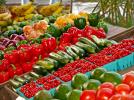H2020 AUTHENT-NET Project: AUTHENT-NET – Food Authenticity Research Network
- Type Project
- Status Filled
- Execution 2016 -2018
- Assigned Budget 499.533,75 €
- Scope Europeo
- Main source of financing Horizon 2020
- Project website Proyecto AUTHENT-NET
It is recognized that Europe's capacity to combat food fraud has historically been weak and lacks the coordination and support structures available to those working in food safety. Several initiatives are underway to address this balance, for example, the DGSanté Food Fraud Network, the DG Research FoodIntegrity project, as well as numerous national programs and industry initiatives. A key area that still needs to be addressed is bringing together national research funding bodies to facilitate the development of transnational research programs. AUTHENT-NET will address this need by mobilizing and coordinating relevant research budget holders to facilitate the final development of a transnational European funding vehicle that would allow Member States (MS) to jointly fund anti-fraud research. Authent-Net consists of a core group of 19 participants from 10 MS, 1 NGO, and the US, who are either national research funding bodies, food authenticity experts, or experts in transnational funding mechanisms. AUTHENT-NET will do the following:
- It will bring together R&D budget holders from relevant Member States to coordinate interdisciplinary research efforts and build a cohesive and sustainable network.
- It will conduct an inventory of existing national research and assess it in relation to the international landscape.
- It will establish transnational mechanisms and instruments to collect and exchange information on food authenticity research.
- It will develop a high-level research and innovation strategy for transnational research and a rationale for a potential ERANET on food authenticity.
The two-year project will have the following expected impacts: improved coordination and communication between research budget holders in the relevant Member States; increased awareness of existing national research; a joint strategy for R&D on food fraud; agreed priorities; and the capacity to deliver transnational European research on food fraud.
Authent-Net has made significant progress and achieved all of the specific objectives in Section 1.1. It has:
- Generic templates have been developed for Member States to collect and input information on their food authenticity and anti-fraud activities.
- The mapping of national activities on food authenticity has been expanded from the original target of 8 Member States to 14.
- Pan-European research mapping has been expanded to four commodities (seafood, beef, olive oil, and honey), increasing from the original target of three (with the addition of honey).
- Developed a secure forum for funders to hold confidential discussions.
- An easy-to-use, open-source information platform on food authenticity has been developed (http://farnhub.authent.cra.wallonie.be/). The Food Authenticity Research Network Hub (FARNHub), co-designed with the funding agencies, contains an inventory of designated Member States' activities, a database of project reports, publications, analysis methods, and a daily updated database of news on food fraud. This freely accessible resource will be maintained on the CRAW website for at least three years after the project ends.
- Held four international workshops and several meetings with funders to expand the network and discuss common issues;
- Produced the Authent-Net website www.authent-net.eu/
- Produced a summary of relevant EU legislation related to food authenticity.
- Produced a CEN Workshop Agreement on a common set of terms for food authenticity.
- He held discussions with funding agencies and the Standing Committee on Agricultural Research (SCAR) committee about submitting an ERANET co-funding proposal to SCAR in 2018.
- Produced a joint strategic research agenda on key future priorities for MS funding bodies
The legacy of the 2013 horsemeat scandal has led to the launch of several major initiatives by industry and governments to combat food fraud and ensure the integrity of the food supply chain. One area that remained under development, prior to the start of this project (April 2016), was the cohesion of research activities among Member States. At the time, there was a lack of access to and awareness of the work of other Member States, which could lead to duplication of efforts at a time when national research budgets were declining and under increasing scrutiny.
From the initial discussions with funders, it was clear that there would be immediate benefits simply by bringing funding agencies together to share experiences and network. Furthermore, funders identified that significant benefits would be achieved simply by providing an inventory of up-to-date information on what has been done, where, and by whom, in terms of R&D in Member States.
Another finding was that very little strategic R&D was being undertaken (the UK was the exception), with most research prioritized annually on a reactive basis. Leveraging was seen as a key method for Member States to maximize their budgets and also a means of having a more strategic element in their programs. An EU network on food authenticity research was recognized as the best way forward. Authent-Net was tasked with meeting that need. The overall objective of Authent-Net is to facilitate sustainable cooperation between national and international research funding bodies in the area of food authenticity, in order to enhance the competitiveness of the food supply chain and consumer confidence in it, through better coordinated and cost-effective R&D.
The specific objectives were:
- Build a network of research funding bodies in Member States to increase knowledge transfer and facilitate transnational cooperation.
- Develop a harmonized set of freely available terms and definitions for use in food authenticity that will support transnational debate and inventory.
- "Mapping" food authenticity in Europe and undertaking an inventory and analysis of existing data (e.g., national research projects, methods, products, databases, regulations, etc.) in the area of food authenticity, with a view to developing synergies and contacts between relevant organizations.
- To assess the gaps and complementarities in European R&D funding for food authenticity and evaluate them in relation to the international landscape, in order to maximize synergies and impact and address where further research is needed.
- To develop a rationale and recommendation for a high-level strategic research agenda for transnational research programs in Europe, broadly based on input from key stakeholders.
- Establish a dynamic and sustainable European information platform for sharing and accessing information on food authenticity and related activities.
- Draft a white paper identifying the rationale for a potential ERA-NET on food authenticity.
- Actively disseminate the objectives and results of the action to other relevant research providers and related stakeholders.
It is recognized that the capacity to combat food fraud in Europe has historically not been consolidated and lacks the coordination and support structures available to those working in food safety. Several initiatives are underway to restore this balance, such as the DGSanté Food Fraud Network, the Research Directorate's FoodIntegrity project, as well as numerous national programs and industry initiatives.
A key area that still needs to be addressed is bringing together national research funding bodies to facilitate the development of transnational research programs. AUTHENT-NET will address this need by mobilizing and coordinating relevant research budget holders to facilitate the eventual development of a transnational European funding vehicle that will allow Member States (MS) to jointly fund anti-fraud research. Authent-NET comprises a core group of 19 participants from 10 Member States, 1 NGO, and the US, who are national research funding bodies; food authenticity experts; and/or experts in transnational funding mechanisms. AUTHENT-NET:
- It will bring together R&D budget holders from relevant Member States to coordinate interdisciplinary research efforts and build a cohesive and sustainable network.
- It will take stock of existing national research and evaluate it against the international landscape.
- It will establish transnational mechanisms and instruments to collect and exchange information on food authenticity research. This will include improved coordination and communication among MS research budget holders; increased awareness of existing national research; a joint R&D strategy against food fraud; and agreed priorities and capacity to conduct transnational European research on food fraud.
Wait a minute, what exactly is in that sausage? This question is easier to answer thanks to the work of an EU-funded project to ensure that food product authentication methods are not implemented in isolation, but through collaboration and information sharing. The 2013 horsemeat scandal led to the launch of several major initiatives to combat food fraud and ensure the integrity of the food supply chain. The European Commission has established a Food Fraud Network, composed of competent authorities involved in identifying and reporting food fraud issues in EU countries. Industry and government are involved in various initiatives aimed at providing cost-effective procedures for ensuring the integrity of the food supply chain. However, for these systems to work, knowledge and expertise must be shared between agencies, across borders.
This is where the EU's AUTHENT-NET (Food Authenticity Research Network) project comes in. The AUTHENT-NET Collaborative and Supportive Concerted Action was devised following an initial dialogue with national funding bodies, through a survey and workshop, prior to the project's launch. From these results, it became clear that there would be immediate benefits simply by bringing funding bodies together to share experiences and network. “Very few of the workshop attendees knew each other, and the only collaborations were through existing EU activities such as SUSFOOD,” explains project coordinator Professor Paul Brereton, Director of Strategic Partnerships at the Institute for Global Food Security in Belfast. They recognized that much could be gained simply by providing an inventory of current information on what has been done, where, and by whom, in terms of research and development in Member States. The project identified a set of urgent needs from a food authenticity control/detection perspective. These included: improved harmonization and pooling of research activity at EU level to support issues related to method standardization (i.e., 'fit-for-purpose methods'); improved access to reference standards, databases, and reference materials; and pooling of available screening tools.
As Professor Brereton explains, an EU network on food authenticity research was recognized as the best way forward. Concerted action is more effective than a piecemeal approach. The overall objective of AUTHENT-NET was to facilitate sustainable cooperation between national and international research funding bodies in the field of food authenticity, to improve the competitiveness of the food supply chain and consumer confidence in it, through better coordinated and cost-effective R&D. “We achieved this by ensuring that all mechanisms and tools were co-created with national funding bodies through a series of meetings and discussions to ensure their suitability. For example, templates for national data collection on research conducted in one Member State were co-designed, tested in one country (the UK), and then slightly revised before being used by 13 more (as of July 2018),” says Professor Brereton. Similarly, the central information repository, the Food Authenticity Research Network Hub (FARNHub), was co-designed with funding agencies to ensure it met their needs. Consolidated information for each EU country is now freely available and accessible through FARNHub.
Many actors lead to certain challenges. It wasn't always easy for AUTHENT-NET to establish precisely who was in charge of funding food authenticity work in each country. In most cases, food authenticity/anti-fraud was horizontally integrated across a range of research councils and government agencies without overall coordination. Therefore, it was necessary for the project to investigate the content and structures of various EU countries more intensively than originally planned. Professor Brereton feels that this aspect fed into the project's most significant outcome, "I think bringing people from different Member States together and getting them to think collaboratively was the biggest achievement. A close second would be the tools we've provided to do that and to share their information." Europe now benefits from a more efficient food authenticity and anti-fraud capacity. The sharing of information and knowledge between Member States, and the resulting increase in collaboration, is good news for EU citizens—both taxpayers and consumers. There will be less duplication in research, leading to savings and greater protection against food fraud. "Personally," says Professor Brereton, "as project coordinator, I am very proud of the consortium members. The commitment and ingenuity of the consortium members was superb and resulted in over-delivering in many areas.
FARNHub is a good example, where all the fruits of our labor have been consolidated into a single, open and accessible information hub, which will remain in place for at least three years after AUTHENT-NET ends."
The collection and consolidation of 14 National Status Reports and 4 Commodity Status Reports already provides insightful information on national research activities in Europe. A single, secure discussion forum specifically for funding bodies has been created and is operational. A Europe-wide analysis of gaps and synergies has been conducted and, together with information from NSIs and ISCs, has been used as a basis for developing a draft joint research agenda for the MA. An interactive hub (FARNHub), specifically designed for use by national funding bodies but also freely accessible to all, has been created to allow funders to quickly determine who is funding what and when on any specific food authenticity topic in Europe. FARNHub offers, for the first time, a single platform for all matters related to food authenticity. Authent-net has also initiated the first formal activity to establish a common set of terms for food authenticity.
The establishment of a CEN Workshop Agreement (CWA) is an important first step in bringing together stakeholders and agreeing on a common vocabulary for this area. Impact An overall key impact of the CSA is a more coordinated and coherent approach across the EU to address common priorities such as improved food fraud detection, better consumer protection, knowledge sharing, maximizing the use of authentic databases, expertise and resources, and reducing duplication of efforts in a budget-constrained world. As a result of Authent-Net, Member States have: a much better knowledge and insight into the pan-European research and surveillance landscape; much more confidence in their ability to elucidate their joint strategic needs and to facilitate transnational collaboration and communication; a much greater awareness of their counterparts in other Member States; and a greater willingness to communicate both pan-Europeanly and bilaterally.
The impact of this increased cohesion is leading to greater efficiency in the implementation and execution of research and monitoring for stakeholders. As a result of its success, Member States already have plans for future network meetings. An important prerequisite for error-free communication and efficient implementation is agreement on the meaning of core terms and concepts within a given field. As a first step, Authent-Net, with extensive stakeholder input and consultations in a consensus-based process, developed a set of terms and conditions for a CEN Workshop Agreement (CWA) “Authenticity in the Food and Feed Chain - General Terms and Concepts.”
- FERA SCIENCE LIMITED (FERA)







